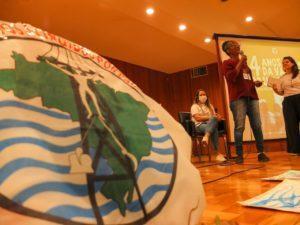Brazilians Demand Justice Four Years after Brumadhino Dam Disaster
Mining and Energy Minister Alexandre Silveira faced demands from the movement and affected people, asking for the punishment of Vale and reparations to families. Photo: Francisco Kelvim
This past week marked four years since the horrific Brumadinho dam disaster in Brazil. The following is a statement by our partner Movimento dos Atingidos por Barragens / Movement of People Affected by Dams (MAB), who held a series of mobilizations to push for overdue justice and reparations.
Four years after the rupture of Corrégo do Feijão dam in Brumadinho, Minas Gerais, affected people demand justice and security
MAB holds a day of struggle for reparation for those affected by the disaster and denounces impunity for the crime that claimed the lives of 272 people, yet could be expelled from court.
January 25th marked four year since the fatal the rupture of the Corrégo do Feijão dam, owned by the Vale corporation, which released 12 million liters of tailings into the Paraopeba River. The crime claimed the lives of 272 people and two unborn, with three bodies still missing. The thickest part of the mud reached 300 kilometers until it reached the Retiro Baixo hydroelectric plant and took everything in its way; dining halls, houses, fields, and areas of the Atlantic were buried.
RISK OF IMPUNITY
Although executives and employees of the mining company have been denounced for this – one of the most serious crimes in the history of the country – four years after the breach, the court has not yet convicted anyone responsible. On this past January 18th, the President of the Federal Supreme Court, Minister Rosa Weber, ruled that the federal justice in Minas Gerais proceed immediately with the criminal proceedings regarding the breach, as “there is an ‘imminent risk’ of reaching the statute of limitations for the environmental crimes described in the indictment, with the established deadline being four years from the accusations in the indictment”, which is on this January 25th. The minister indicates that an immediate trial of the case is necessary to avoid this statute of limitations, as the trial by popular jury may continue, even with the federalization of the case. For MAB, it is extremely important to avoid impunity for those involved.
VALE DENIES FULL ENVIRONMENTAL AND SOCIAL REPARATION
With regard to repairing the damage caused to the communities affected by the crime, Vale remains in control of the process, based on agreements with the State and the Judiciary. Those affected are denied participation in debates on the actions that affect them directly, such as the definition of social programs, public services, and works in the impacted territories and individual and collective indemnities.
According to Fernanda Portes, member of the MAB coordination, for the repair to be comprehensive and to cover all environmental damage in the territory, Vale needs to be punished. “And the longer this punishment takes, the risk of recidivism of crimes and the ‘revictimization’ of the people affected increases, as there is an increase in social vulnerability and the deepening of situations of violation of human rights, such as: food and water insecurity; socioeconomic damage (in work and income, agriculture, livestock), and increased physical and mental health problems, including a large number of suicides.”
COLLECTIVE DAMAGES TO THE PUBLIC HEALTH
In this context, among the main concerns of the affected population are: the delay in repairing the individual damage caused by the rupture and the problems related to the presence of the tailings that remain in the soil, air, and water of the Paraopeba River Basin.
Studies carried out by institutes, universities, city halls, and independent technical advisories prove that there are toxic metals in huge amounts in the Basin. The situation has worsened in the context of intensifying climate change globally. In late 2021 and early 2022, major flooding in Minas Gerais brought the toxic mud of the Paraopeba river back to the houses of the riverside residents. The floodwaters, filled with ore tailings, worsened the pre-existing damages, with new risks to public health, agriculture, water supply, and more.
MINING STILL DOES NOT GUARANTEE THE SAFETY OF THOSE AFFECTED
According to MAB, the two biggest socio-environmental crimes in the history of Brazil have not in fact lead to a change in the criminal pattern of mining. According to Fernanda Portes, the ‘safety’ practices of the projects are not effective from the point of view of protecting life. “The risk continues, as similar crimes occur with other companies and the tailings dams, all of which have an expiry date, work like time bombs over the heads of towns and cities. In Congonhas, the ‘Casa de Pedra’ (CSN) tailings dam is a typical case of this ‘criminal pattern.’ The largest dam in an urban area in all of Latin America, with 103 million m3 of ore waste, is classified by the system as being of ‘high power of damage with low risk,’” said Portes.

